How Sleep-Tracking and Supplements Work Together to Maximize Rest
Introduction
You wake up, check your sleep tracker, and it says you slept for seven hours — but you still feel tired. 😴 Or maybe you hit your goal of eight hours, yet your “deep sleep” score is mysteriously low.
Here’s the truth: not all sleep is restorative — and the secret to better rest lies in understanding both your body’s data and your body’s chemistry.
That’s where sleep tracking and targeted supplementation work beautifully together. 🧠💊
When used wisely, tracking devices reveal how your body sleeps, while supplements give your system the nutrients it needs to achieve deeper recovery. Together, they help you build habits that optimize energy, focus, and mood — naturally.
Let’s explore how to pair these tools to turn your nights into true recovery time. 🌿
Looking for supplements for Brain Fog? Click here.
💤 The New Science of Sleep Optimization

Sleep isn’t just about time — it’s about cycles and efficiency.
Your brain alternates through four main stages:
Stage 1: Light sleep — transition between wakefulness and rest.
Stage 2: Stabilization — heart rate and body temperature drop.
Stage 3: Deep (slow-wave) sleep — physical and neural repair happens.
REM Sleep: Dream stage — emotional processing and memory consolidation.
The balance of these stages determines how refreshed you feel in the morning.
💡 For most adults, the goal is around 20–25% deep sleep and 25% REM.
Sleep-tracking devices like the Oura Ring, Whoop Band, or Apple Watch give you insights into these patterns — but what you do with the data is what makes the difference.
📊 What Sleep Trackers Actually Measure
Modern trackers don’t just count hours — they analyze physiological signals to show how well your body is resting.
Key metrics include:
Heart Rate Variability (HRV): A measure of nervous system balance. Higher HRV = better recovery.
Resting Heart Rate (RHR): Drops during deep sleep. If elevated, it may indicate stress or poor nutrition.
Sleep Stages: Breakdown of light, deep, and REM sleep.
Latency: How long it takes to fall asleep.
Efficiency: Ratio of time asleep vs. time in bed.
Sleep tracking helps you find patterns — but supplements help you act on them. For example:
Low deep sleep + high stress = magnesium or ashwagandha may help.
Poor REM = try glycine or Omega-3s to support neurotransmitter balance.
⚙️ How Supplements Fill the Gaps Your Tracker Reveals
Once you understand your data, you can personalize your supplement plan to target weaknesses.
For example:
You fall asleep easily but wake up often → you might need magnesium or L-theanine.
You get enough hours but low deep sleep → glycine or zinc can help.
You feel mentally foggy in the morning → consider CoQ10 or B-vitamins for mitochondrial energy.
🧩 Tracking shows the “what.” Supplements fix the “why.”
🧬 The Best Supplements for Sleep Optimization
Here are the top science-backed supplements that align with specific sleep metrics your tracker measures.
🌿 Magnesium Glycinate or L-Threonate
If your sleep tracker shows frequent awakenings or low deep sleep, magnesium might be your missing link.
Why it helps:
Calms the nervous system by activating GABA receptors
Lowers heart rate and promotes muscle relaxation
Improves HRV overnight
Dosage: 200–400 mg, 30–60 minutes before bed.
💤 Essential for anyone with high-stress or restless sleep patterns.
💭 L-Theanine
If your tracker shows long sleep latency (trouble falling asleep), this green-tea amino acid can help.
Why it helps:
Increases alpha brain waves (calm alertness)
Reduces cortisol and mental chatter
Improves REM quality and subjective rest
Dosage: 100–200 mg before bed.
🌱 Perfect for overthinkers and night-time worriers.
🌼 Glycine
If your tracker shows low deep sleep or frequent movement during the night, glycine can help.
Why it helps:
Lowers core body temperature for faster sleep onset
Improves slow-wave (deep) sleep duration
Enhances next-day alertness
Dosage: 3 g (about ½ teaspoon powder) 30 minutes before bed.
❄️ A simple amino acid that deepens your recovery cycle.
🌺 Ashwagandha (KSM-66 or Sensoril)
If your HRV is low or resting heart rate is elevated, your stress system is likely overactive.
Why it helps:
Reduces cortisol
Improves sleep efficiency and stress resilience
Supports hormone balance and energy
Dosage: 300–600 mg/day (preferably at dinner).
🌙 Your adaptogenic ally against modern overstimulation.
🧠 Omega-3 Fatty Acids (DHA & EPA)
If your REM sleep is short or fragmented, you may benefit from Omega-3s.
Why it helps:
Enhances serotonin signaling
Supports healthy brain structure
Reduces inflammation that disrupts REM cycles
Dosage: 1000–2000 mg/day.
🐟 Brain nourishment that indirectly enhances emotional recovery during sleep.
🔋 Coenzyme Q10 (CoQ10)
If your morning readiness score is low, CoQ10 can support mitochondrial recovery.
Why it helps:
Fuels cellular energy production
Combats oxidative stress from poor sleep
Supports cardiovascular recovery
Dosage: 100–300 mg/day, taken with food.
⚡ Ideal for high performers and shift workers.
🌾 Zinc + Vitamin B6 (ZMA)
If your deep sleep percentage is low, this combo can help regulate melatonin and testosterone production.
Why it helps:
Enhances deep sleep quality
Supports muscle recovery overnight
Balances stress and immune response
Dosage: 30 mg zinc + 10 mg B6 before bed.
💪 Especially helpful for athletes or anyone with evening stress.
Looking for supplements for Brain Fog? Click here.
📲 What Sleep Data Reveals About Your Body Chemistry
Your tracker isn’t just showing you sleep — it’s showing you how well your biochemistry is functioning.
| Tracker Metric | What It Means | Supplement Solution |
|---|---|---|
| Low Deep Sleep | Poor magnesium, zinc, or glycine levels | Magnesium, Glycine |
| Long Sleep Latency | Overactive stress response | L-Theanine, Ashwagandha |
| Low REM | Neurotransmitter imbalance | Omega-3s, B-Complex |
| Low HRV | Chronic stress or inflammation | Magnesium, Ashwagandha, CoQ10 |
| High RHR | Cortisol or stimulant overload | Adaptogens, Hydration |
💡 Track → Analyze → Supplement → Track again → Adjust.
That’s the loop of real sleep optimization.
🧘 Breathwork: The Natural Sleep Enhancer

Breathwork pairs beautifully with supplements — it’s free, fast, and regulates your autonomic nervous system.
Try This: “4-7-8 Breathing for Sleep” 🌬️
Inhale through your nose for 4 seconds.
Hold for 7 seconds.
Exhale slowly through your mouth for 8 seconds.
Repeat 5–10 times before bed.
Benefits:
Activates the parasympathetic system
Lowers heart rate and blood pressure
Enhances magnesium and L-theanine’s calming effects
✨ Combine it with your nightly supplement routine for faster sleep onset and better HRV readings.
Want to try Breathwork? Click Here.
🧩 Therapy and Emotional Regulation for Better Sleep Data
Sleep trackers often reveal patterns tied to emotional stress — like frequent awakenings after conflict, or low REM after anxiety.
Therapy helps you process those emotional loads so your nervous system can finally relax at night.
Benefits of Therapy for Sleep Optimization:
Improves stress management and emotional boundaries
Reduces rumination (night-time overthinking)
Enhances emotional recovery during REM sleep
Pairing therapy with adaptogens like ashwagandha or Rhodiola builds both emotional and physiological resilience — the true foundation of consistent sleep scores. 🧘
Looking for online therapy ? Click Here.
🌙 Evening Routine to Combine Tracking + Supplementation
Sample “Sleep Optimization” Routine
| Time | Habit | Why It Works |
|---|---|---|
| 🕗 8:30 PM | Log your day & avoid screens | Signals circadian rhythm shift |
| 🕣 9:00 PM | Take supplements (magnesium, glycine, L-theanine) | Starts calming neurotransmission |
| 🕤 9:15 PM | 4-7-8 breathing or gratitude journaling | Lowers cortisol & anxiety |
| 🕙 10:00 PM | Sleep tracker ON, lights off | Consistent timing improves rhythm |
💤 Repeat nightly — your data will confirm steady improvements over 2–3 weeks.
🧬 How Sleep-Tracking Motivates Long-Term Consistency
Most people give up on supplements because they don’t “feel” results immediately.
Sleep tracking changes that.
By pairing the two, you get visible proof:
✅ Higher deep sleep percentages
✅ Lower heart rate
✅ Improved HRV and recovery scores
✅ Shorter sleep latency
Seeing this feedback keeps you consistent — and consistency builds transformation.
⚠️ Common Mistakes When Combining Tracking and Supplements
🚫 Relying on data without context: Trackers are tools, not verdicts. Check trends, not single nights.
🚫 Over-supplementing: More isn’t better. Focus on targeted support.
🚫 Ignoring lifestyle: Poor nutrition, late-night screens, and high stress undo supplement progress.
🚫 Taking magnesium or melatonin too late: Timing matters — aim for 60–90 minutes before sleep.
💡 Your tracker is feedback, not failure. Use it to refine, not obsess.
🧠 The Synergy of Data + Biology
When sleep tracking meets supplementation, you create a full-circle recovery loop:
Track: Measure your body’s rhythms and weaknesses.
Nourish: Give your system the nutrients it’s missing.
Recover: Deepen sleep and lower stress.
Refine: Adjust based on real feedback.
The result? You stop guessing — and start mastering your rest.
🌿 Science meets self-awareness — that’s the future of sleep health.
🌟 Final Thoughts
Sleep tracking shows you what’s happening. Supplements help you change it.
By merging technology with nutrition, you empower both awareness and action — two forces that turn sleep into true recovery.
When you combine the insights from your tracker with natural supplements, mindful breathwork, and emotional balance, you’re not just chasing better numbers — you’re building a body and brain that truly rest well, recover deeply, and wake ready.
✨ Your sleep data is your blueprint. Your supplements are your tools. Together, they unlock your best rest. 🌙
📚 References
Walker M. Why We Sleep. Scribner, 2017.
Kennedy DO. “Nutritional nootropics and sleep performance.” Nutrients. 2016;8(11):68.
Streeter CC, et al. “Breathwork and autonomic regulation.” J Altern Complement Med. 2012;18(5):402–412.
Abbasi B, et al. “Magnesium supplementation improves sleep quality.” J Res Med Sci. 2012;17(12):1161–1169.
Panossian A, Wikman G. “Adaptogens and stress modulation.” Pharmaceuticals. 2010;3(1):188–224.
Yamadera W, et al. “Glycine ingestion improves subjective sleep quality.” Sleep Biol Rhythms. 2007;5(2):126–131.
Related Posts
-
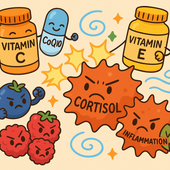
Antioxidants for Stress Management and Cortisol Control
When stress overwhelms your body, antioxidants come to the rescue. 🌿 Learn how vitamin C, CoQ10, and other natural compounds help reduce oxidative stress, regulate cortisol, and restore calm energy from within. ✨
-
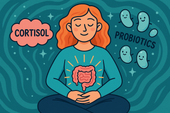
Cortisol and Gut Health: How Probiotics May Help
Chronic stress doesn’t just affect your mind — it changes your gut. 🌿 Learn how cortisol disrupts the microbiome and how probiotics can help restore balance, improve digestion, and calm your stress response naturally. ✨
-

Vitamin D and Cortisol: Supporting Immune Balance
Vitamin D does more than strengthen bones — it helps regulate cortisol and support immune balance. 🌞 Learn how this essential hormone-like nutrient restores calm, improves mood, and strengthens your body’s natural stress defenses. 🌿
-
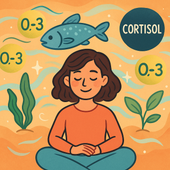
Omega-3s and Cortisol: Fighting Inflammation Naturally
Omega-3s are more than heart-healthy fats — they’re natural cortisol regulators. 🌿 Learn how EPA and DHA help reduce chronic inflammation, calm the nervous system, and support stress recovery from the inside out. ✨
-
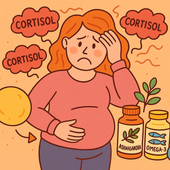
High Cortisol and Belly Fat: Can Supplements Help?
Chronic stress can make belly fat harder to lose — but supplements like ashwagandha, magnesium, and omega-3s may help restore cortisol balance. 🌿 Learn how science-backed nutrients support fat metabolism, calm your stress response, and bring your body back into harmony. ✨
-
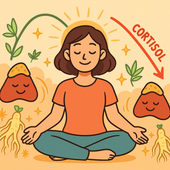
How Ginseng Can Support Energy and Cortisol Balance
Ginseng is one of nature’s most powerful adaptogens, helping your body handle stress without burning out. 🌿 Learn how this ancient root supports balanced cortisol, steady energy, and sharper focus — restoring vitality naturally and sustainably. ✨
-
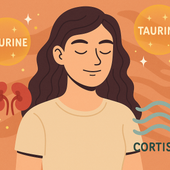
Taurine and Cortisol: Supporting Focus Under Stress
When cortisol surges, focus fades — but taurine helps restore balance. 🌿 Learn how this powerful amino acid calms your nervous system, regulates stress hormones, and sharpens concentration without jitters or fatigue. ✨
-
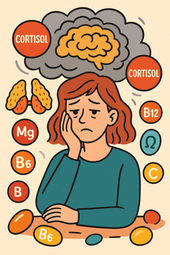
The Link Between Cortisol, Brain Fog, and Nutrient Deficiencies
When brain fog sets in, it’s not just in your head — it’s in your hormones. 🌿 Discover how cortisol imbalance and nutrient deficiencies like low magnesium, B vitamins, and omega-3s can cloud your focus and how restoring balance brings back mental clarity and calm. ✨
-
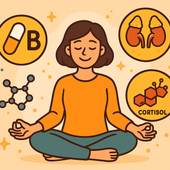
B Vitamins for Stress, Energy, and Cortisol Regulation
B vitamins are the foundation of stress resilience and steady energy. 🌿 Learn how this essential group of nutrients helps regulate cortisol, restore focus, and keep your nervous system calm — giving you balance from the inside out. ✨
-

Cortisol Imbalance and Chronic Fatigue: Can Supplements Help?
When chronic stress keeps cortisol high, fatigue and brain fog follow. 🌿 Learn how to rebalance your stress hormones naturally with calming nutrients, adaptogens, and lifestyle rituals that restore energy, focus, and inner peace. ✨
-

Adaptogen Stacks for Better Sleep and Lower Stress Hormones
Adaptogens can help your body recover from stress and sleep better by regulating key hormones like cortisol and adrenaline. 🌿 Learn how adaptogen stacks work to restore balance, calm the mind, and rebuild resilience — so you can rest deeply and wake renewed. ✨
-

Phosphatidylserine for Nighttime Cortisol Control
When stress hormones stay high at night, deep rest becomes impossible. 🌙 Discover how phosphatidylserine helps calm the brain, reduce nighttime cortisol, and restore healthy sleep rhythms — so you can wake up peaceful, clear, and recharged. ✨
-

Magnesium for Stress Relief and Cortisol Reduction
Magnesium is one of the most powerful natural tools for stress relief. 🌿 This essential mineral calms your nervous system, lowers cortisol, and helps your body recover from chronic tension. Learn how magnesium replenishes balance, improves sleep, and restores inner peace — naturally. ✨
-

Supplements to Improve Sleep by Balancing Cortisol
When cortisol stays high at night, sleep becomes a struggle. 🌙 Discover natural supplements that calm the nervous system, lower stress hormones, and restore your body’s natural rhythm. From magnesium and ashwagandha to L-theanine and phosphatidylserine, learn how to build deeper, more restorative rest. 🌿
-

Cortisol and Sleep: Why Stress Keeps You Awake
When stress keeps your body in fight-or-flight mode, cortisol refuses to calm down — and sleep becomes impossible. 🌙 Learn how elevated cortisol disrupts your circadian rhythm, suppresses melatonin, and turns restless nights into exhaustion. Discover how to restore balance and reclaim deep rest. ✨
-

L-Theanine for Cortisol Balance and Anxiety Relief
L-Theanine — the calming amino acid from green tea — helps quiet the mind and balance cortisol, the body’s key stress hormone. 🌿 Learn how it promotes calm focus, eases anxiety, and supports deep rest without sedation, backed by modern research and centuries of tradition. ✨
-

Rhodiola Rosea and Stress Resilience: A Natural Cortisol Regulator
Rhodiola rosea is one of nature’s most powerful tools for resilience. 🌿 This Arctic root helps balance cortisol, fight fatigue, and sharpen focus — keeping you calm yet energized even under stress. Discover the science behind Rhodiola’s adaptogenic power and how it helps your body thrive under pressure. ✨
-

Ashwagandha for Cortisol Balance: What the Science Says
Ashwagandha helps your body recover from chronic stress by calming the adrenal system and balancing cortisol — your key stress hormone. 🌿 Learn what science says about this powerful adaptogen, how it restores energy and focus, and why it’s one of nature’s most effective tools for modern stress relief. ✨
-

Supplements That Naturally Lower Cortisol Levels
When cortisol levels calm, your energy transforms — no more crashes or jitters, just steady focus and inner peace. 🌿 Learn which natural supplements and habits lower stress hormones, boost calm energy, and help your body thrive with balance instead of burnout. ✨
-

What Is Cortisol Imbalance? Symptoms You Shouldn’t Ignore
Cortisol — your body’s main stress hormone — keeps you alert and energized, but when it’s out of balance, it can drain your health. 🌿 Learn the signs of cortisol imbalance, from fatigue and anxiety to sleep disruption and stubborn weight gain, and discover how to restore calm, energy, and hormonal harmony naturally. ✨
-

The Best Daily Multivitamins for Menopausal Women
Menopause brings new nutritional needs that your old vitamin routine may no longer meet. 🌿 Discover how the right daily multivitamin can boost energy, balance mood, support bone and heart health, and keep your skin glowing. Learn which nutrients truly matter — from vitamin D to magnesium and B12 — to feel strong and vibrant every day. ✨
-

Antioxidants and Menopause: Fighting Inflammation Naturally
During menopause, oxidative stress and inflammation can quietly accelerate aging, fatigue, and skin changes. 🌿 Learn how antioxidants — from vitamins C and E to polyphenols in berries and green tea — help neutralize free radicals, reduce inflammation, and restore balance naturally. Discover the science of radiant, resilient aging. ✨
-

How CoQ10 Supports Heart Health After Menopause
After menopause, heart health becomes more important than ever. ❤️ Discover how CoQ10 — your body’s natural energy molecule — supports cardiovascular strength, restores vitality, and protects against oxidative stress. Learn how this essential nutrient helps keep your heart energized, balanced, and resilient through every stage of life. 🌿
-

Collagen Supplements for Skin and Joint Health Post-Menopause
After menopause, collagen loss affects both skin elasticity and joint comfort — but supplements can help rebuild from within. 🌸 Learn how collagen peptides, vitamin C, and other nutrients work together to restore firmness, reduce stiffness, and keep you glowing and mobile well into your next chapter. ✨
-

Calcium and Vitamin D: Protecting Bone Health in Menopause
Menopause brings hormonal changes that can weaken bones—but with the right nutrients, strength and stability can be rebuilt. 🦴 Learn how calcium and vitamin D work together to protect bone density, prevent fractures, and keep your body resilient. This guide explores nutrition, sunlight, and lifestyle habits that help your bones stay strong and vibrant for years to come. ☀️💪
-

Adaptogens for Energy and Resilience During Menopause
Feeling drained or emotionally scattered during menopause? 🌿 Discover how adaptogenic herbs like Ashwagandha, Rhodiola, and Ginseng can restore energy, balance cortisol, and build emotional resilience. Learn how these natural allies work with your body—not against it—to help you stay strong, focused, and calm through life’s hormonal changes. 🌸
-

Supplements That Help Beat Menopause Fatigue
Menopause fatigue can feel like more than tiredness—it’s a total energy crash. This guide explores how specific supplements, mindful breathwork, and therapy can help restore balance. Learn how nutrients like B vitamins, magnesium, and adaptogens rebuild your stamina, while breathwork and emotional healing calm your nervous system and bring vitality back to your days. 🌿✨
-

Herbal Blends for Menopausal Restlessness: Finding Calm in Transition
Herbal blends bring the wisdom of nature into moments of rest and renewal. Discover how soothing herbs like chamomile, lemon balm, and ashwagandha work together to calm menopausal restlessness, balance hormones, and invite deep relaxation. 🌿💫
-

Magnesium + Glycine for Deep Sleep During Menopause
Nutrients like magnesium, glycine, and B vitamins form the foundation for deep, restorative sleep during menopause. Discover how these natural compounds calm your nervous system, balance hormones, and help you wake up refreshed and recharged. 🌿💤
-

Melatonin and Menopause: Restoring Your Sleep Cycle
Nutrients are the foundation of hormone balance and energy. Learn how vitamins, minerals, and whole foods like greens, salmon, and berries nourish women’s bodies during menopause and beyond — restoring vitality, mood, and strength. 🌿🥗
-

How L-Theanine Helps With Menopausal Anxiety
Science continually deepens our understanding of the human body, from hormones to neurotransmitters. Discover how evidence-based research shapes modern wellness — bridging natural medicine, neuroscience, and hormone balance for healthier living. 🔬🌿
-

Can Ginkgo Biloba Improve Memory in Menopausal Women?
Hormone therapy can be a powerful tool for easing menopause symptoms and restoring balance. Learn how it works, the types available, and how to combine it safely with lifestyle and natural support for optimal well-being. 🌸💊
-

B Vitamins for Mental Clarity During Menopause
Nutrients are the foundation of mental and physical balance during menopause. Discover how vitamins, minerals, and whole foods like leafy greens, fish, nuts, and citrus can fuel energy, clarity, and calm while supporting hormonal health. 🌿✨
-

Mood Swings and Menopause: Natural Nutrient Support
Probiotics do more than support digestion — they help balance mood, hormones, and immunity too. Learn how a healthy gut microbiome can ease menopause symptoms, boost energy, and improve emotional resilience naturally. 🌿🦠
-

Brain Fog in Menopause: Supplements That May Help
Supplements can be powerful allies in restoring balance, energy, and focus—especially during menopause. Learn how nutrients like omega-3s, vitamin D, magnesium, and herbal adaptogens work together to support brain health, reduce stress, and promote lasting vitality. 🌿💊
-

Adaptogen Stacks for Reducing Night Sweats
Hormone detox isn’t about cleansing your body—it’s about restoring flow. Learn how the liver, gut, and endocrine systems work together to eliminate hormone buildup and how herbs like milk thistle, dandelion, and schisandra support balance, clarity, and natural vitality. 🌿💫
-

Cooling Menopause Symptoms with Herbal Support
Ashwagandha is one of nature’s most powerful adaptogens, helping women manage stress, sleep better, and balance hormones naturally. Discover how this ancient root supports calm energy, emotional resilience, and relief from menopause-related anxiety and fatigue. 🌿💫
-

Evening Primrose Oil and Menopause: What the Research Says
Hot flashes are one of the most common—and frustrating—symptoms of menopause. Discover what causes them, why the body’s “internal thermostat” becomes unbalanced, and the natural supplements and lifestyle shifts that can help you cool down, rest better, and feel more in control. 🔥💧
-

How Black Cohosh Helps with Menopausal Symptoms
Sleep disturbances are among the most exhausting symptoms of menopause—but they don’t have to rule your nights. Discover how natural strategies and calming supplements can help you fall asleep faster, stay asleep longer, and wake up feeling truly restored. 🌙💤
-

Natural Supplements That May Reduce Hot Flashes
Hot flashes can disrupt sleep, confidence, and daily comfort—but natural relief is possible. Discover the best research-backed supplements like black cohosh, red clover, and licorice root that may reduce hot flashes, balance hormones, and restore inner calm during menopause. 🌿💫
-

Omega-3s and Menopause: Supporting Mood and Inflammation
Omega-3 fatty acids are essential for hormonal harmony, brain function, and emotional balance—especially during menopause. Learn how these healthy fats reduce inflammation, support heart health, and restore calm, vitality, and focus through every stage of midlife. 🌊💫
-

The Role of Vitamin D in Menopausal Health
Vitamin D plays a powerful role in menopausal health—supporting bone strength, hormone balance, and mood stability. Discover how optimizing your vitamin D levels can improve sleep, energy, and emotional well-being while protecting long-term vitality through every stage of menopause. 🌞💪
-

Magnesium for Menopause: Relaxation, Sleep, and Hormonal Support
Self-regulation is the art of staying calm, centered, and in control—no matter what life throws your way. Learn how to strengthen emotional balance, manage stress responses, and cultivate inner peace through mindful techniques that reconnect your heart, body, and brain. 🌿💫
-

Can Adaptogens Like Ashwagandha Ease Menopausal Symptoms?
Brain fog during menopause can make even simple tasks feel overwhelming—but you’re not losing your sharpness, your hormones are simply shifting. Discover how adaptogens like ashwagandha and key nutrients can restore mental clarity, balance cortisol, and bring calm focus back to your day. 🌿🧠
-

Supplements That Support Hormonal Balance During Menopause
Herbal supplements have supported women’s health for centuries—and modern science is finally catching up. From ashwagandha and maca to red clover and rhodiola, discover how nature’s most trusted herbs can calm stress, balance hormones, and enhance energy through every life stage. 🌿✨
-

The Ultimate Motivation Stack: Supplements That Work Together
Discover how therapy helps restore motivation, focus, and emotional balance alongside supplement and mindset strategies. This empowering article explores how addressing thought patterns and emotional blocks through therapy can complement biochemical tools for long-term drive and well-being. 🧠💬
-

Entrepreneurial Drive: Can Supplements Help You Avoid Burnout?
Entrepreneurship demands energy, creativity, and mental resilience—but without balance, it leads to burnout. This in-depth article explores how nootropic supplements, adaptogens, and mindset tools can help entrepreneurs sustain motivation, manage stress, and keep their drive sharp for the long haul. 🚀💼
-

Supplements for Students: Staying Motivated Through Exams
Feeling burned out before finals? Discover how the right supplements can help students stay focused, calm, and motivated through exam season. This guide explores science-backed nutrients, brain-boosting herbs, and mindset tools that fuel clarity, memory, and stress resilience when it matters most. 🎓⚡
-

How Nootropic Stacks Can Enhance Drive and Focus Together
Discover how nootropic stacks can reignite both your drive and focus by balancing key neurotransmitters like dopamine and acetylcholine. This in-depth guide explores the science behind motivation, how supplements enhance cognitive performance, and how breathwork and therapy complete the picture for lasting mental clarity. 🧠✨
-

Natural Pre-Workout Supplements for Motivation and Mental Sharpness
Adaptogens are nature’s stress balancers 🌿 — powerful herbs like Ashwagandha, Rhodiola, and Holy Basil that help your body stay calm, focused, and resilient. By regulating cortisol and supporting energy balance, they boost motivation, endurance, and emotional stability — naturally. 🌞🧠


















































